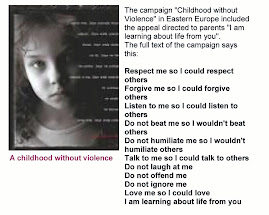

Tuesday, 29 May 2007
2007 05: Move whips up interest
The Star online. News. Opinion. Monday May 28, 2007
The Anti-Trafficking in Persons Bill is seen as a progressive bill. Should the Government stop at this or go on to remove corporal punishment from all existing legislation?
COMMENT BY SHAILA KOSHY
THE last week of the Dewan Rakyat meeting flagged Malaysia internationally for two very different reasons.
Courtesy of the Internet, reports of the sexist remarks made in the House and subsequent reaction were picked up by several Internet news digests and for those who prefer a visual and aural account of their news, the incident is on YouTube.
That aside, the House did well in passing the Anti-Trafficking in Persons Bill 2007 that covers illegal conduct committed inside or outside Malaysia as long we are the receiving country or transit point.
The new bill got second billing in the May issue of we! an e-newsletter by Isis International-Manila (www.isiswomen.org).
“The new law is a major change for the better. It is tough on offenders and very comprehensive in its reach,” it quotes Tenaganita executive director Dr Irene Fernandez, who is among several groups that have lobbied the Government for laws to protect trafficked women and children.
Police statistics show 371 trafficked women were rescued here between 2004 and 2006.
When the bill finally comes into force, trafficked victims will not have to fear prosecution for illegal entry or entering Malaysia with false travel documents provided by the traffickers, and informers will be protected.
They will be placed in shelters for between three months to two years, while the authorities gather evidence against the traffickers.
Minister in the Prime Minister's Department Datuk Seri Nazri Aziz told Parliament that by enacting this law the Government could ratify the Protocol to Prevent, Suppress and Punish Trafficking in Persons, Especially Women and Children (TIP Protocol) that supplements the United Nations Convention Against Transnational Organised Crime, which Malaysia acceded to in September 2004.
He also disclosed the Office to Monitor and Combat Trafficking in Persons in the United States Department of State had placed Malaysia in the Tier 2 Watch List in its 2006 report.
(The Tier 2 Watch List is defined as countries whose governments do not fully comply with the minimum standards of the US' Trafficking Victims Protection Reauthorisation Act but are making significant efforts to comply.)
At a meeting in New York last year, the UN Committee on the Elimination of Discrimination Against Women had also urged the Malaysian Government to ratify the TIP Protocol.
The irony is the Government will receive bouquets for the new bill at the next reporting in 2008 but it will also draw brickbats from the UN committee for the incidents of sexism in Parliament.
The Executive must be credited for originating this bill but the amazing fact about the bill is that the Attorney General's draftsman did not include whipping because the TIP Protocol does not recognise whipping as a form of punishment.
In lieu, Malaysia has provided for hefty jail terms (three to 20 years) and fines (RM50,000 to RM500,000).
So, has the Government embraced international human rights norms or was it constrained to do so?
If the former, it must remove whipping from the Penal Code, Kidnapping Act, Firearms (Increased Penalties) Act, Dangerous Drugs Act and the Immigration Act, among others.
“If it is because it is contrary to the concept of human rights then it is an indication that we are accepting the culture of human rights,” says Suhakam chairman Tan Sri Abu Talib Othman.
“The Government should not stop at the Anti-Trafficking in Persons Bill but should review all existing legislation that provides for whipping and remove that provision. We will support them in such a move.”
“This is a progressive bill and one hopes it would be a precursor to other efforts to review present legislation which provides for whipping,” says International Movement for a Just World president Dr Chandra Muzaffar.
“Also, as a mode of punishment, whipping - which is cruel and dehumanising - has been proven to be ineffective in tackling the root causes of the crime.”
Does the new bill sans whipping mean civil society in Malaysia is becoming more “civilised?”
“I don’t know whether it is a reflection of a change of heart or an attempt to respond to international pressure,” says Dr Chandra who was appointed to the Chair in Global Studies under the Centre for Policy Research and International Studies at Universiti Sains Malaysia in April.
“One swallow doesn’t make a summer but one hopes that this will lead to other changes.”
Noting the Malaysian Bar had a passed a resolution against corporal punishment at its annual general meeting in March, its president Ambiga Sreenevasan, welcomes the Government's recognition of international norms regarding corporal punishment.
“The UN considers whipping an inhuman and degrading form of punishment; logically, the Government should remove whipping from all the statute books.”
So, if the bill is not to score points internationally or get off the US Watch List, the Government must see to it that all existing laws are whipping-free.
The Anti-Trafficking in Persons Bill is seen as a progressive bill. Should the Government stop at this or go on to remove corporal punishment from all existing legislation?
COMMENT BY SHAILA KOSHY
THE last week of the Dewan Rakyat meeting flagged Malaysia internationally for two very different reasons.
Courtesy of the Internet, reports of the sexist remarks made in the House and subsequent reaction were picked up by several Internet news digests and for those who prefer a visual and aural account of their news, the incident is on YouTube.
That aside, the House did well in passing the Anti-Trafficking in Persons Bill 2007 that covers illegal conduct committed inside or outside Malaysia as long we are the receiving country or transit point.
The new bill got second billing in the May issue of we! an e-newsletter by Isis International-Manila (www.isiswomen.org).
“The new law is a major change for the better. It is tough on offenders and very comprehensive in its reach,” it quotes Tenaganita executive director Dr Irene Fernandez, who is among several groups that have lobbied the Government for laws to protect trafficked women and children.
Police statistics show 371 trafficked women were rescued here between 2004 and 2006.
When the bill finally comes into force, trafficked victims will not have to fear prosecution for illegal entry or entering Malaysia with false travel documents provided by the traffickers, and informers will be protected.
They will be placed in shelters for between three months to two years, while the authorities gather evidence against the traffickers.
Minister in the Prime Minister's Department Datuk Seri Nazri Aziz told Parliament that by enacting this law the Government could ratify the Protocol to Prevent, Suppress and Punish Trafficking in Persons, Especially Women and Children (TIP Protocol) that supplements the United Nations Convention Against Transnational Organised Crime, which Malaysia acceded to in September 2004.
He also disclosed the Office to Monitor and Combat Trafficking in Persons in the United States Department of State had placed Malaysia in the Tier 2 Watch List in its 2006 report.
(The Tier 2 Watch List is defined as countries whose governments do not fully comply with the minimum standards of the US' Trafficking Victims Protection Reauthorisation Act but are making significant efforts to comply.)
At a meeting in New York last year, the UN Committee on the Elimination of Discrimination Against Women had also urged the Malaysian Government to ratify the TIP Protocol.
The irony is the Government will receive bouquets for the new bill at the next reporting in 2008 but it will also draw brickbats from the UN committee for the incidents of sexism in Parliament.
The Executive must be credited for originating this bill but the amazing fact about the bill is that the Attorney General's draftsman did not include whipping because the TIP Protocol does not recognise whipping as a form of punishment.
In lieu, Malaysia has provided for hefty jail terms (three to 20 years) and fines (RM50,000 to RM500,000).
So, has the Government embraced international human rights norms or was it constrained to do so?
If the former, it must remove whipping from the Penal Code, Kidnapping Act, Firearms (Increased Penalties) Act, Dangerous Drugs Act and the Immigration Act, among others.
“If it is because it is contrary to the concept of human rights then it is an indication that we are accepting the culture of human rights,” says Suhakam chairman Tan Sri Abu Talib Othman.
“The Government should not stop at the Anti-Trafficking in Persons Bill but should review all existing legislation that provides for whipping and remove that provision. We will support them in such a move.”
“This is a progressive bill and one hopes it would be a precursor to other efforts to review present legislation which provides for whipping,” says International Movement for a Just World president Dr Chandra Muzaffar.
“Also, as a mode of punishment, whipping - which is cruel and dehumanising - has been proven to be ineffective in tackling the root causes of the crime.”
Does the new bill sans whipping mean civil society in Malaysia is becoming more “civilised?”
“I don’t know whether it is a reflection of a change of heart or an attempt to respond to international pressure,” says Dr Chandra who was appointed to the Chair in Global Studies under the Centre for Policy Research and International Studies at Universiti Sains Malaysia in April.
“One swallow doesn’t make a summer but one hopes that this will lead to other changes.”
Noting the Malaysian Bar had a passed a resolution against corporal punishment at its annual general meeting in March, its president Ambiga Sreenevasan, welcomes the Government's recognition of international norms regarding corporal punishment.
“The UN considers whipping an inhuman and degrading form of punishment; logically, the Government should remove whipping from all the statute books.”
So, if the bill is not to score points internationally or get off the US Watch List, the Government must see to it that all existing laws are whipping-free.
Subscribe to:
Post Comments (Atom)



No comments:
Post a Comment